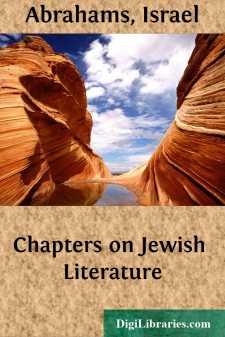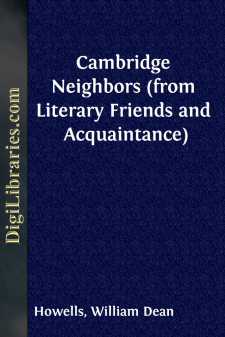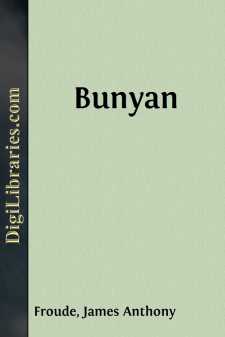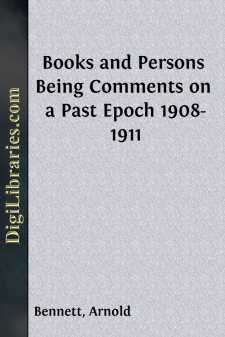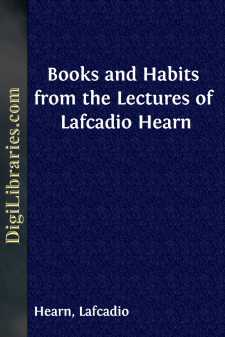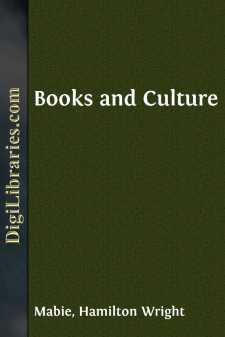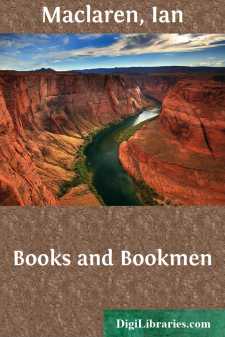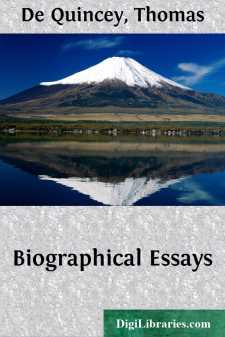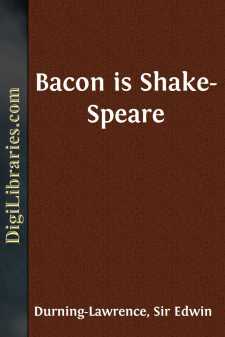Literary Criticism
- American 18
- Ancient and Classical 3
- Asian 1
- Australian & Oceanian 1
- Books & Reading 8
- Caribbean & Latin American 2
- Drama 2
- English, Irish, Scottish, Welsh 49
- European 7
- General 37
- Horror 1
- Humor 2
- Jewish 2
- Medieval 2
- Middle Eastern 3
- Poetry 7
- Renaissance 6
- Russian & Former Soviet Union 1
- Shakespeare 27
Literary Criticism Books
Sort by:
by:
Israel Abrahams
CHAPTER I THE "VINEYARD" AT JAMNIA Schools at Jamnia, Lydda, Usha, and Sepphoris.—The Tannaim compile the Mishnah.—Jochanan, Akiba, Meir, Judah.—Aquila. The story of Jewish literature, after the destruction of the Temple at Jerusalem in the year 70 of the Christian era, centres round the city of Jamnia. Jamnia, or Jabneh, lay near the sea, beautifully situated on the slopes of a gentle...
more...
Being the wholly literary spirit I was when I went to make my home in Cambridge, I do not see how I could well have been more content if I had found myself in the Elysian Fields with an agreeable eternity before me. At twenty-nine, indeed, one is practically immortal, and at that age, time had for me the effect of an eternity in which I had nothing to do but to read books and dream of writing them, in...
more...
EARLY LIFE. 'I was of a low and inconsiderable generation, my father's house being of that rank that is meanest and most despised of all families in the land.' 'I never went to school, to Aristotle or Plato, but was brought up in my father's house in a very mean condition, among a company of poor countrymen.' 'Nevertheless, I bless God that by this door He brought me...
more...
by:
Arnold Bennett
WILFRED WHITTEN'S PROSE 4 Apr. '08 An important book on an important town is to be issued by Messrs. Methuen. The town is London, and the author Mr. Wilfred Whitten, known to journalism as John o' London. Considering that he comes from Newcastle-on-Tyne (or thereabouts), his pseudonym seems to stretch a point. However, Mr. Whitten is now acknowledged as one of the foremost experts in...
more...
by:
Lafcadio Hearn
Introduction These chapters, for the most part, are reprinted from Lafcadio Hearn’s “Interpretations of Literature,” 1915, from his “Life and Literature,” 1916, and from his “Appreciations of Poetry,” 1917. Three chapters appear here for the first time. They are all taken from the student notes of Hearn’s lectures at the University of Tokyo, 1896-1902, sufficiently described in the...
more...
Chapter I. Material and Method. If the writer who ventures to say something more about books and their uses is wise, he will not begin with an apology; for he will know that, despite all that has been said and written on this engrossing theme, the interest of books is inexhaustible, and that there is always a new constituency to read them. So rich is the vitality of the great books of the world that...
more...
by:
Ian Maclaren
BOOKS AND BOOKMEN They cannot be separated any more than sheep and a shepherd, but I am minded to speak of the bookman rather than of his books, and so it will be best at the outset to define the tribe. It does not follow that one is a bookman because he has many books, for he may be a book huckster or his books may be those without which a gentleman’s library is not complete. And in the present...
more...
SHAKSPEARE.[Endnote: 1] William Shakspeare, the protagonist on the great arena of modern poetry, and the glory of the human intellect, was born at Stratford-upon-Avon, in the county of Warwick, in the year 1564, and upon some day, not precisely ascertained, in the month of April. It is certain that he was baptized on the 25th; and from that fact, combined with some shadow of a tradition, Malone has...
more...
CHAPTER I THE HISTORICAL ELEMENTS Section I. The Problem. The unique MS of Beowulf may be, and if possible should be, seen by the student in the British Museum. It is a good specimen of the elegant script of Anglo-Saxon times: "a book got up with some care," as if intended for the library of a nobleman or of a monastery. Yet this MS is removed from the date when the poem was composed and from...
more...
The plays known as Shakespeare's are at the present time universally acknowledged to be the "Greatest birth of time," the grandest production of the human mind. Their author also is generally recognised as the greatest genius of all the ages. The more the marvellous plays are studied, the more wonderful they are seen to be. Classical scholars are amazed at the prodigious amount of...
more...


